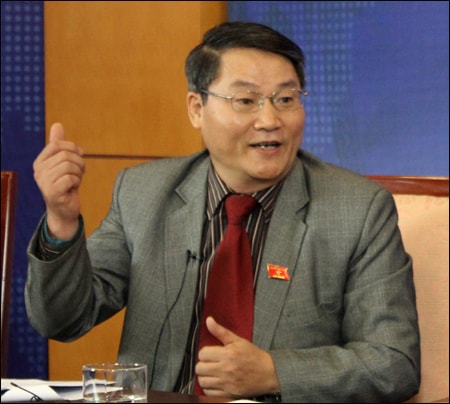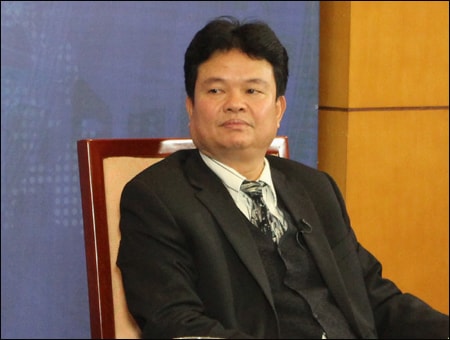Socialization of healthcare: Is it a matter of personal gain?
Some recent incidents have somewhat affected people's trust, and public opinion has even raised questions about group interests.
The Government Portal has just organized an online discussion program with the topic: "Socialization in health care work". Many contents were mentioned and analyzed by delegates, in which the negative side of socialization work, most clearly shown through a number of "sloppy" cases at many health facilities in recent times.
The policy is correct but needs monitoring and inspection.
According to Mr. Nguyen Van Tien, Vice Chairman of the National Assembly's Committee on Social Affairs, Vietnam's healthcare has progressed very rapidly over the past decade, and health care conditions for the people have been constantly improved. However, the State's investment resources are limited, so socialization plays a very important role. Reality has proven that socialization of healthcare is a correct and relatively effective policy.
 |
Mr. Nguyen Van Tien, Deputy Chairman of the National Assembly's Committee on Social Affairs |
Mr. Nguyen Tien Quyet, Director of Viet Duc Hospital, said that in recent years, the State has invested heavily in healthcare, but has not been able to meet the demand. Socialization to mobilize resources to upgrade healthcare facilities is practical and the patients benefit first.
“Previously, domestic hospitals did not have the equipment, so many people had to go abroad for treatment at double or triple the cost. Thanks to socialized activities, many modern machines have been equipped, and the accuracy in examination, diagnosis and treatment has been improved,” Mr. Quyet affirmed.
The effectiveness of socialization in medical examination and treatment is evident. However, after a number of recent incidents at medical facilities, public opinion is concerned about the negative side of socialization. That is whether or not there are "group interests", abuse of testing and imaging; Hospital leaders collude with outside companies to bring in equipment to share and exploit for personal gain.
Mr. Nguyen Van Tien, Vice Chairman of the National Assembly's Committee on Social Affairs, admitted that "public opinion is partly correct", but it is impossible to base an assessment on individual cases, but requires evidence and a scientific basis.
According to Deputy Minister of Health Pham Le Tuan, in the context of limited budget, socialization will help medical facilities be equipped with modern machinery; medical staff have access to advanced technology to improve their professional qualifications, thereby making disease diagnosis more accurate, treatment better, and patients benefit.
“However, in recent times, socialization in healthcare still has some shortcomings, some incidents have occurred, unit leaders have been disciplined, and some have been caught up in legal trouble. This is very regrettable,” said Mr. Tuan.
 |
| Deputy Minister of Health Pham Le Tuan |
According to the Deputy Minister of Health, through inspection, it was found that most of the units that made mistakes did not fully comply with regulations, instructions, and procedures; supervision, self-inspection, and the role of the leader and the collective were unclear. This is also an issue that the Ministry of Health is very concerned about and will rectify in the coming time.
Where can I get a machine to "cover up"?
In response to information that state-invested machines with minor breakdowns are "shelved", while socialized machines run at full capacity, with even shorter waiting times, Director of Viet Duc Hospital, Mr. Nguyen Tien Quyet, expressed: "We must have evidence to speak."
"A hospital with insufficient machines to provide services to the people will not have any of them left unused. Our hospital currently only has one socialized machine, an MRI machine. As for the places with "left unused" machines, is it because the State has invested too much in them, or is it redundant? To know for sure, we must check and verify them transparently," said Mr. Quyet.
Regarding this issue, Mr. Nguyen Van Tien, Vice Chairman of the National Assembly's Committee on Social Affairs, said that in reality, when State-invested machines break down, it takes a long time to repair. The reason lies in administrative procedures.
“Requesting a budget for repairs takes a lot of time. A broken light bulb that costs millions of dong can take months to request. This is also a limitation that prevents the machines from being used to their maximum efficiency. As for the machines that are socialized and invested by the private sector, they only need to be submitted the day before and repaired the next day, so it is understandable that it is quick,” Mr. Tien said.
Regarding administrative procedures, Deputy Minister of Health Pham Le Tuan explained that the Budget Law has very strict regulations and we must comply with the law. For public hospitals, if you want to spend on something, it must be in the budget. Therefore, if you do not plan well and the budget does not take into account situations, then when a machine breaks down, you must report and request funding.
Another difficulty that makes the approval of machinery repair budget take a long time, according to Deputy Minister Pham Le Tuan, is that the budget for equipment maintenance is not guaranteed. This also needs to be studied, learned from, and prioritized to use machinery effectively, serving the people best./.
According to VOV.VN






